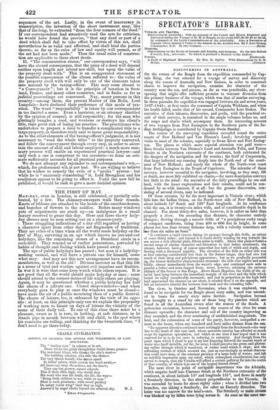THE FIRST OF MAY.
MAT-DAY, even in London? is still celebrated, or partially cele- brated, by a few. The chimney-sweepers walk their rounds. Knots of ribbons are attached to the heads of the omnibus-horses, and bunches of flowers to the saddles. Before many windows pots of mignionette are stuck up—an indulgence in a small luxury reserved to grace this day. Here and there showy holy- day dresses may be seen setting out on a pleasure-party.
t These straggling indications of a day still regarded as having a character apart from other days are fragments of traditions. They are relics of a time when all the world made holyday on the first of May, surviving in an age which knows no out-and-out holydays, like the remaining stones of a Druidical circle in a corn-field. They remind us of earlier generations, pervaded by habits of thought and feeling which have passed away.
The age of public holydays has passed ; but man is a holyday- making animal, and will have a private one for himself; come what may. And may not this new arrangement have its recom- mendations, as well as the old? Divines instruct us that this life is a scene of trial and warfare against evil impulses and frailties. In war it is wise that some keep watch while others repose. It is not good that all the world should make holyday at once : some should attend to the earnest duties of life while others are playing. Again, it may be questioned whether a public holyday has half the charm of a private one. Closed shop-windows—and when everybody goes to play at once the windows must be closed— have more the air of a public mourning than of a public festival. The, charm of leisure, too, is enhanced by the view of its oppo- site: at least, on this principle only can we explain the propensity of working men to haunt on days of leisure the vicinity of the scene of their daily toil. To one of this class there must be a pleasure, sweet as it is rare, in looking, at safe distance, as he stands pipe in mouth between wife and child, to the spot where his comrades are toiling, and thinking for the twentieth time, "I don't need to go there today.


















































 Previous page
Previous page